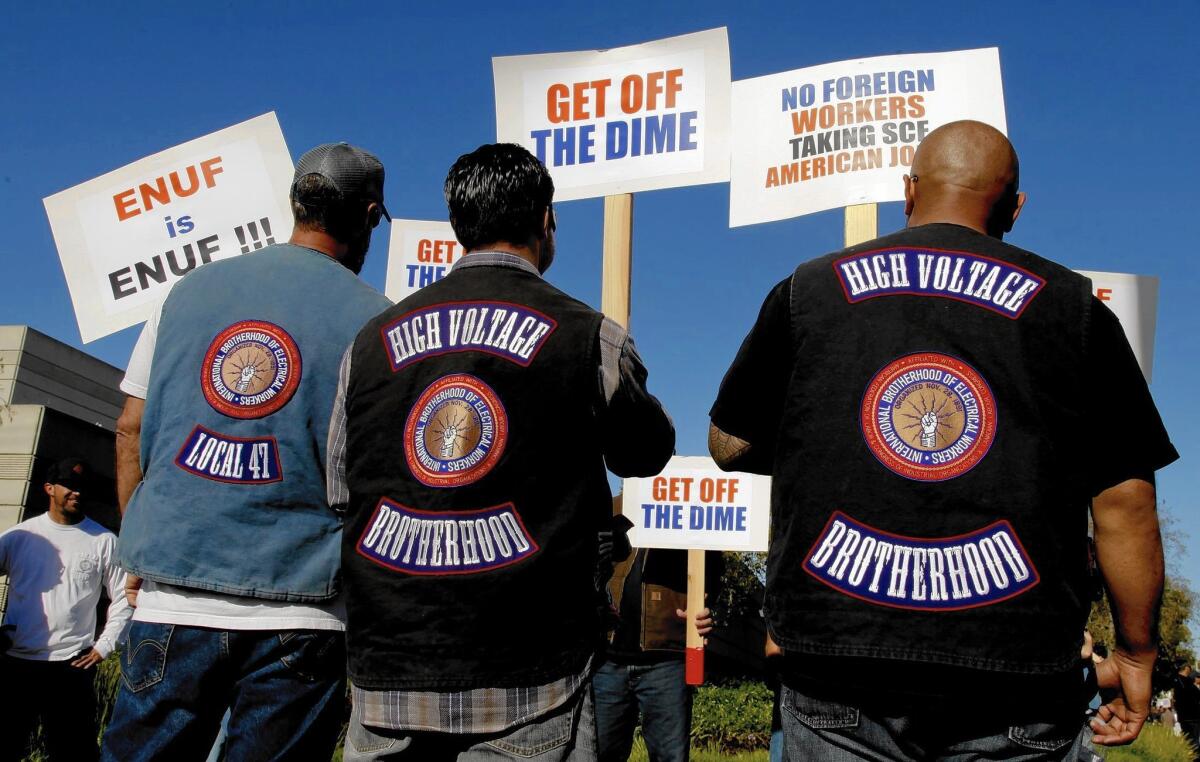Edison’s plans to cut jobs, hire foreign workers is assailed

Southern California Edison’s plans to lay off hundreds of employees and hire foreign workers instead is coming under attack from lawmakers in Congress and local unions.
On Tuesday, more than 300 members of the International Brotherhood of Electrical Workers rallied in Irvine in support of their fellow Edison employees and protested what they say are unfair labor practices.
Meanwhile, members of Congress are upset about reports that Edison is laying off workers in favor of bringing in cheaper labor from overseas under the controversial H-1B visa program. The visas are intended to bring in skilled and educated foreign workers.
Edison denied that it was using the H-1B program to fill jobs previously held by U.S. workers.
The company “is not hiring H-1B workers to replace displaced employees,” Edison said in a statement. “Any H-1B visa workers SCE does hire for its own workforce are paid a wage comparable to SCE’s domestic workforce.”
The Southland’s largest utility said it is laying off about 400 information technology employees, with an additional 100 leaving voluntarily. The layoffs are necessary, the company said, to stay competitive.
Edison said it is outsourcing some tech-related work to two Indian companies, Infosys in Bangalore and Tata Consultancy Services in Mumbai. The vendors were selected after Edison looked at multiple firms, including some in the U.S.
“SCE has made, and will continue to make, difficult business decisions,” Edison said. “SCE does not take this action lightly and it is assisting employees through this difficult period.”
About 70% of the work to be done by Tata and Infosys will be completed offshore, Edison spokeswoman Susan Cox said. She said she didn’t know whether foreign workers would be brought to the U.S. to complete the remaining 30%.
Despite the uncertainty, speculation that Edison would bring workers from India to the U.S. renewed debate over the H-1B visa program and sparked a backlash from Edison’s Southland workers.
Many who protested Tuesday in Irvine on behalf of the IT workers carried signs with slogans such as “No Foreign Workers!” and “Get Off the Dime.”
Cynthia Kelly was one of hundreds of Edison employees who protested. A bookkeeper who has worked for Edison for 12 years, she said the company’s new foreign hires don’t understand the technology and cannot trouble-shoot computer issues.
“It’s really bad,” the Torrance resident said. “We’re on hold for like three hours. We get someone on the line and they hang up on us. That’s how it works.”
Scott Wetch, a Sacramento lobbyist for several locals of the International Brotherhood of Electrical Workers, said Edison is “systematically outsourcing jobs.”
“As people come over on H-1B visas, they literally lay off other people at the Irvine tech center,” Wetch said.
He said the timing is especially bad coming on the heels of Edison winning a legal settlement at the California Public Utilities Commission. The settlement allows it to collect $3.3 billion from ratepayers and $1.4 billion from shareholders to fund the cost of closing the San Onofre nuclear power plant near San Clemente.
“It’s all part of the same narrative,” said Wetch, adding that legislation in response to the layoffs is already in the works in Sacramento. “They are bringing in cheaper labor … and sticking it to ratepayers.”
Several lawmakers also lambasted the utility.
Rep. Darrell Issa, a Republican from Vista, said Edison is “merely replacing current workers with lower-paid counterparts.”
“This appears to be an example of precisely what the H-1B visa is not intended to be: a program to simply replace American workers en masse with cheap labor from overseas,” he said in a statement.
Sen. Jeff Sessions (R-Alabama) said the Edison layoffs are part of a growing trend of companies that use H-1B visas to bring in foreign workers for jobs that could be filled by Americans.
“You come in on the H-1B visa program for the sole purpose of taking a job,” Sessions said in a speech on the Senate floor last week. “They come solely for a limited period of time to take a job, and they work for less pay too often.”
The uproar over Edison is coming at a time when many high-tech companies are pushing Congress to expand the H-1B program. Last month, Sen. Orrin Hatch (R-Utah) introduced a bipartisan bill that would sharply increase the number of skilled guest worker visas available every year.
Times staff writer Marc Lifsher contributed to this report.
Twitter: @ByShanLi
